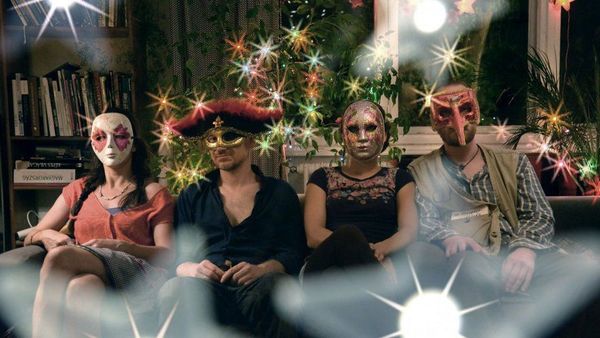Eye For Film >> Movies >> It's Not The Time Of My Life (2016) Film Review
It's Not The Time Of My Life
Reviewed by: Amber Wilkinson

Directors looking for inspiration in how to get things done on a budget, could take a leaf out of Szabolcs Hajdu's book. The Hungarian director's latest feature started out as a stage play and when it came to adapting it for the big screen, he drew on what was around him, not only casting himself, his actress wife Orsolya Török-Illyés and children Zsigmond and Lujza in key roles but shooting the film in his own apartment and drafting in 13 of his students as cinematographers. Even the distribution model has been innovative, with Hajdu telling anyone who has an apartment, a projector and 20 friends who are happy to pay 1500 forint (£4) to see the film that they can.
More importantly, they should, because the end result - a study of easily triggered crisis at the heart of a modern Hungarian family - is a lot more polished than you might expect. Hajdu uses the cramped space of the apartment where Farkas (Hajdu) and Eszter (Török-Illyés) live with their hyperactive son Bruno (Zsigmond Hadju) to his advantage, so that the characters feel trapped, not by the confines of the script but by the airlessness of their day-to-day existence.

Tensions are apparent from the start, with Farkas a lot less able to take the pressure of Bruno's demands than his wife. The couple are in the middle of a full-on shouting match when they suddenly receive unexpected guests. Ezster's sister (Erika Tankó), her husband Albert (Domokos Szabó) and their cusp-of-adulthood teenager Laura (Lujza Hajdu) have staged a sudden retreat from their emigre lives in Scotland - for reasons that are not revealed until later.
Like much of the film, this situation offers scope for Hajdu to offer barbed observations about not only the state of his nation but that of others, with the line of dialogue: "The Scots, at first they seem friendly, then they show their true colours", taking on additional resonance in the wake of Brexit.
The already full apartment now seems to bulge with discontent, as the adults retreat to old battle grounds that see loyalties shifting and the children swim about in the middle. He also highlights the little lies we tell ourselves, such as when Farkas tells his son he can't play with him because he has to work, only for it later to be revealed that he was playing patience on his computer. All the while, his team of cinematographers glide the cameras around the apartment, retaining a sense of movement.
Hadju doesn't go easy on his characters but he also remembers that they are human and gradually allows the positive side of each to show through as well as the dark. The situation may be a little forced but the emotional truth flows freely.
Reviewed on: 01 Dec 2016















